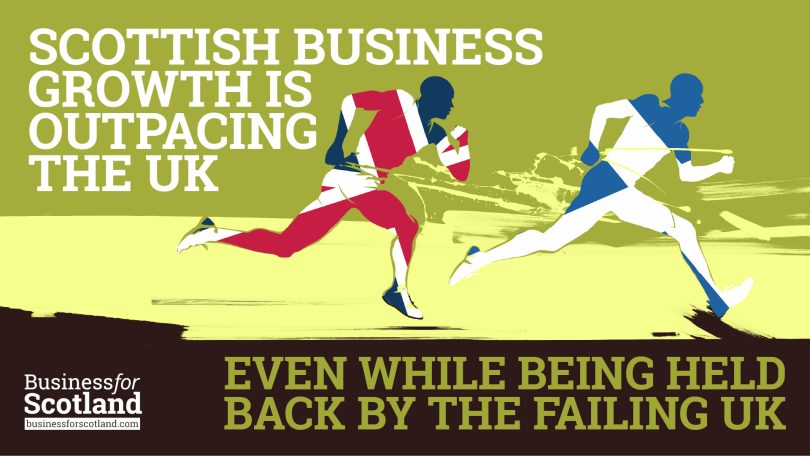Scottish businesses are outperforming the UK average in terms of three key metrics, according to a recent report by respected accounting group ICAEW.
Profits growth, capital investment and export sales growth are all higher in Scotland than the UK average.
These findings come after the news earlier this month that Scotland continues to be the most attractive location outside of London for inward investment, with more than 8,500 jobs created last year.
Confidence impacted by challenges
The findings, from a business survey by the accounting group ICAEW, were reported in the Scottish press under negative headlines, which focused mainly on the finding that business confidence is slightly lower in Scotland than the UK as a whole.
There are very real challenges of course – it was also revealed last month that Scotland has lost 12% of its exports by value to the EU in just two years. The value of exports to the rest of the UK has gone up by a similar amount.
But despite the strong awareness Scottish business leaders have of the challenges facing them, the survey found that on three key metrics the sector is growing more strongly than other areas of the UK.
A new survey this week – Bank of Scotland’s Business Barometer – showed that Scottish business confidence is up 11 points from last year (though still a bit lower than the UK).
The ICAEW report found Scotland is doing better than the average in three areas
#1 Profits growth in Scotland higher than the UK average
As a result of rising selling prices and strong domestic sales, Scottish businesses achieved profits growth of 3.3%, outstripping the UK average.
This trend looks set to continue with profits growth expected to reach 5.3% in Scotland over the next 12 months compared to 4.6% for the UK.
The ICAEW reported: “At an annual rate of 5.0% in Q4 2023, increases in domestic sales [in Scotland] have been steady and favourable relative to most nations and regions in the UK.”
#2 Capital investment in Scotland higher than the UK average
Capital investment spending in Scotland in 2023 was among the highest in the UK and is set to grow faster than anywhere else over the coming year.
Firms in Scotland also continue to raise their research and development budgets. While this is expected to moderate in the coming year, the projected rate of increase keeps Scotland among the top performers in the UK.
#3 Export sales growth higher than the UK average
According to the survey, export sales in Scotland grew by 3% in the last quarter of 2023. The report concluded that, while slower than the summer: “The pace of increase tracks the historical average for Scotland and is faster than most other nations and regions in the UK.”
It also found that going forward, Scotland looks likely to continue to improve against the UK average: “Encouragingly, businesses anticipate a more robust export performance in the year ahead, at 5.2% which is ahead of expectations elsewhere in the UK.”
Inward investment, equity investment and innovation growing
Scotland continues to be the most attractive location outside of London for inward investment, with more than 8,500 jobs created last year.
Research from 2023 showed that 2022 equity investment into Scottish businesses reached a record £953 million – an increase of 26% from 2021. Scotland was the top performing area outside London and the South-East on this metric.
There are many areas of growing success in the Scottish economy. With more than 700 life sciences organisations employing over 42,500 people, Scotland is one of the largest life sciences clusters in Europe. Scotland is also home to 227 Fintech companies with the cluster’s jobs growing by a quarter in two years. The country has one of the largest critical technology clusters in the UK, with a turnover estimated at over £2.8 billion. Scotland’s space industry has over 130 companies in a sector that employs 18% of the UK workforce and has seen recent revenue growth of 30%.
Business challenges relate to Brexit and the UK’s discriminatory visa rules
However, the ICAEW said Scottish companies also reported a number of growing challenges.
The majority of businesses said they were struggling with regulatory requirements and two-fifths said they had difficulties with marketplace competition – both the highest rates in the UK. Additionally, almost one-third of respondents reported challenges in recruiting non-management skills.
“With economic concerns continuing to weigh on Scottish businesses, the business confidence monitor presents a mixed picture, with sentiment down although still positive, and strong sales and profits growth which is set to continue,” said David Bond, ICAEW director for Scotland.
These issues are not helped by the ongoing struggles with Brexit, which Business for Scotland has been covering over the last seven years and with no sign of easing off. New regulations on imports are likely to add to cost and complexity.
The difficulty to recruit skilled workers created by Brexit persists. As part of the EU, Scottish businesses, particularly in hospitality and agriculture, had access to a strong pool of seasonal workers who could come over for the summer months. That is no longer available.
The difficulty of attracting skilled workers is made worse by the UK government’s discriminatory immigration rules. They take no account of the fact that salaries are lower in Scotland than the South-East of England and are raising the Partner and Family Visa minimum income requirement from £18,600 to £29,000 this year. Next year it will increase to £38,700.
Conclusion – Scotland is still being held back by a failing UK
Scotland’s businesspeople are continuing to build strong businesses, to innovate and to respond creatively to the many challenges they face. They are building the strong economy Scotland will need for a prosperous and stable future as an independent country.
Unfortunately, Scotland is still far from achieving the levels of prosperity experienced by small independent countries in the EU, which have far less of the natural resources Scotland has. Too many problems are imposed on Scotland because of England’s obsession with Brexit and Westminster’s immigration rules which discriminate against Scotland.
An independent Scotland back in the EU will be able to aspire to the economic success that other independent countries regard as normal.








